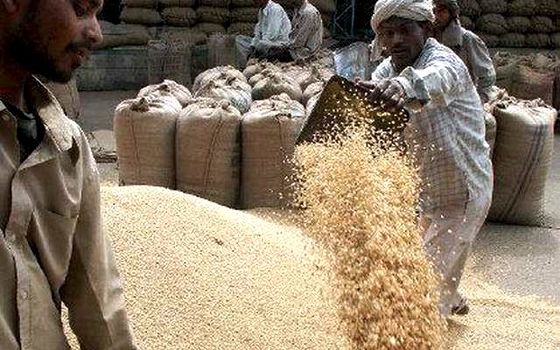With only limited opportunity to improve wheat yields due to shortages of arable land and water, Egypt is looking to tightening up the storage and logistics links in its grain supply chain to reduce import costs and bolster food security.
Egypt’s annual wheat consumption is between 15m and 20m tons, the exact figure being imprecise as growers often hold back up to half of their harvest for personal consumption and seed stock for the coming season’s planting. Of the total consumption, Egypt regularly imports 10m tonnes or more of wheat per year on international markets, making it the world’s largest importer of the grain.
These imports impose a significant drain on Egypt’s currency reserves. The bulk of the $4.6bn the state spends annually on food imports goes towards buying grain. Wheat represented the largest single subsidy expenditure after fuel price support, which was unexpectedly cut at the start of July, increasing the prices of car fuel and natural gas by more than 70% and driving up food prices by 20% according to economists.
Barriers to upping production
The government has sought to reduce its reliance on imports by encouraging greater output at home, but the potential for growth within the agriculture sector is limited.
“Farmers are encountering various challenges from weather, to market prices, agricultural input prices, labor, etc.,” Nasser Abualrous, Egypt Country Head for the agribusiness group Syngenta, told OBG. “Production cost is on the rise and the only way to have profitable farming is to adopt technology and adopt agricultural best practices to increase yield dramatically,” he added.
Most of the arable land suitable for wheat cultivation has already been put under the plough, while residential and industrial expansion is placing additional pressure on available farmland and scarce water resources, with urban sprawl accounting for an increasing proportion of fields.
Reaping full value from harvest
To compensate for its limited production capacity, Egypt is stepping up measures to ensure that the maximum possible of each harvest reaches the mills safely and in good condition. Estimates put wastage as a result of losses while in store or while being transported at between 1m and 1.6m tons a year, damage that is valued at up to $500m. It is believed that much of this loss will be prevented through upgrading the network of silos across the country and planned improvements to logistics services.
In May, nine new silos with a combined capacity of 45,000 tons in the port city of Alexandria were inaugurated, with a further 18 units, each capable of holding 5000 tons of grain, due to be completed by June next year.
The new silos are part of a broader program, announced late last year, to expand the country’s grain storage capacity from 3m tons to 4.5m tons so as to both reinforce food security and reduce wastage. In turn, this will also reduce the imports bill, allowing more funds to be directed into the local economy.
This program has been given support by the UAE, which is providing funding for up to 25 wheat silos with a combined capacity of 1.5m tons. Contracts for the construction of the first of these silos, to be built in the northern districts of Amiriya and Damietta, were awarded in late May.
In the market for grain
Egypt’s existing silos are already filling with this year’s harvest. The state grain agencies are well on their way to reaching their buying target for this season, having announced earlier this year their intention to acquire 4.4m tons of domestic wheat, estimated at around half the total harvest.
The remainder of expected demand will again be fulfilled by imports. In 2013, Egypt took a lower profile on the international grain markets, scaling back imports as foreign currency shortages and weakened exchange rates impacted buying power. This year, the more stable political situation combined with international support has prompted a determined return to the market.
Most recently, the General Authority of Supply Commodities (GASC), the state agency responsible for grain imports, announced in May it had struck agreements with Ukraine for a sizeable purchases of wheat, with 60,000 tons due to be delivered in the last 10 days of June. This purchase comes on top of the 230,000 tons contracted from Ukraine, Russia and Romania in April.
Egypt may also cast its import net wider this year, with the GASC mulling plans to ease last year’s restrictions on water content. Egypt set a limit of 13% moisture content in imported grain, a level that all but ruled out sales from France, which was formerly one of the country’s leading wheat suppliers. But with a moisture content of about 13.5%, French wheat was unable to meet the tighter requirements in 2013. If the GASC, which is responsible for around half of Egypt’s average 10m tons of wheat imports, does draw back on its standards, this would open up more import opportunities and broaden the base of Egypt’s buying program.
Oxford Business Group
17 July
























































